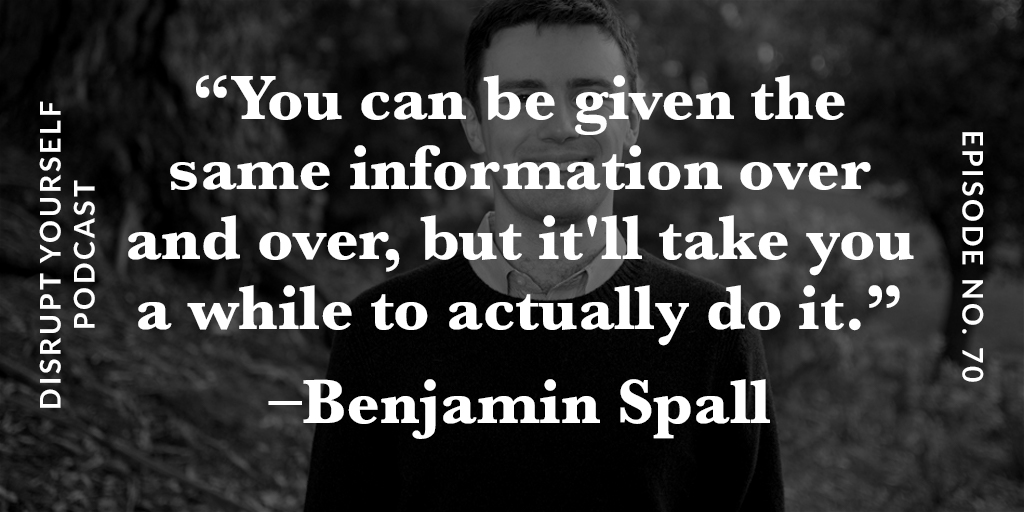Benjamin Spall keeps his phone in the kitchen at night.
As co-author of the book My Morning Routine: How Successful People Start Every Day Inspired, and mymorningroutine.com, Benjamin has heard many highly successful people highlight the importance of keeping their phone away from them while they sleep. However, it still took over four years for Benjamin to finally adopt the practice.
“It’s interesting that you can be given the same piece of information from many different people over and over and over again, but it’ll take you a while for that information to actually sink in and for you to do it.”

While the concept of morning routines is discussed widely today, back in 2012 it was mostly unrecognized in the field of personal development. After interviewing over three hundred individuals about their daily habits, Benjamin has a firm grasp on what routine actions can positively impact a person’s day. Separating yourself from your cell phone is only one element out of many: what time you wake up, what you do immediately after opening your eyes, how many steps you take before you settle into your work—all of it creates your “morning wind,” and if you plan things out properly that wind can carry you throughout your day.
The biggest mistake that people make when trying to create a morning routine is adding too many elements at once. Benjamin recommends starting small: if you want to run every morning, start by only running for 5-10 minutes. That’s easy for you to accomplish, allowing you to start your day with a “win” and less likely to feel like a failure if you can’t squeeze a half hour exercise into your morning every day. Each activity should build to the next, helping you gain momentum.
“It’s kind of like driving a car…in the beginning you’re kind of focusing on everything. And I remember I would barely remember to breathe ‘cause I was on the freeway. But now everything is completely normal. I know what I’m doing, I don’t forget anything. And it’s the same with actually just putting stuff in order in your morning routine. Once one thing finishes another thing begins…it just makes it so much easier and you’re much less likely to forget about it.”
Push-ups, jumping jacks, meditation, eating a healthy breakfast, reading—whatever will help give you energy, embrace it and plan for it. Join me as I discuss with Benjamin some excellent tips from his book on how to start every day inspired, as well as some of the most interesting morning routines he’s written about.
Listen on iTunes or in the player above. If you like what you hear, please leave a review.
Takeaways from this episode:
- If you’re starting a new morning routine, write down what you want to do. This will help you remember and increase the likelihood that you’ll accomplish the list.
- Sleep is VERY important. Benjamin recommends reading “Why We Sleep” by Matthew Walker to gain a better understanding of how a lack of sleep can impact your life.
- Morning routines do not have to be long—in fact, you should start with a short routine, as it will help you establish your patterns and increase the likelihood of your adhering to it.
- As you increase the elements of your routine only add one or two things at a time. Give yourself a week to adjust before adding anything else.
- Your routine should be designed to help you start your day with energy, so avoid doing things that will take stress into your day. Don’t be afraid to scale back.
Links in this episode:
- Benjamin Spall – Website | LinkedIn | Twitter
- My Morning Routine: How Successful People Start Every Day Inspired by Benjamin Spall and Michael Xander
- My Morning Routine (website)
- The Power of Habit: Why We Do What We Do in Life and Business by Charles Duhigg
- How to Have a Good Day: Harness the Power of Behavioral Science to Transform Your Working Life by Caroline Webb
- Disrupt Yourself Podcast – Episode 68: Caroline Webb
- Deep Work: Rules for Focused Success in a Distracted World by Cal Newport
- So Good They Can’t Ignore You: Why Skills Trump Passion in the Quest for Work You Love by Cal Newport
- Why We Sleep: Unlocking the Power of Sleep and Dreams by Matthew Walker
- MyMorningRoutine.com/book
- BenjaminSpall.com
- Disrupt Yourself Podcast – Episode 66: Philip Sheppard

